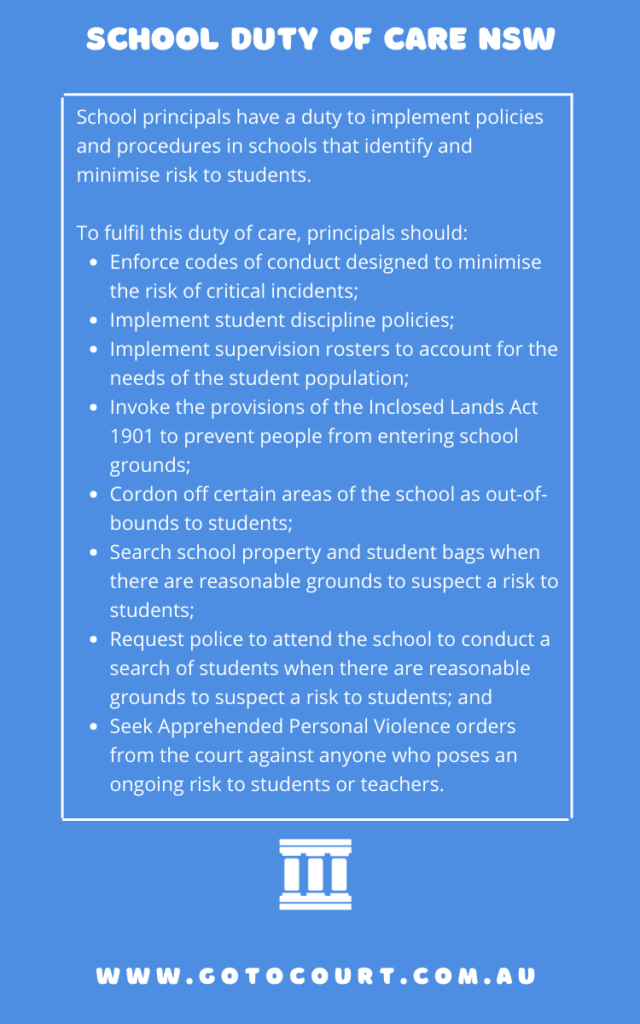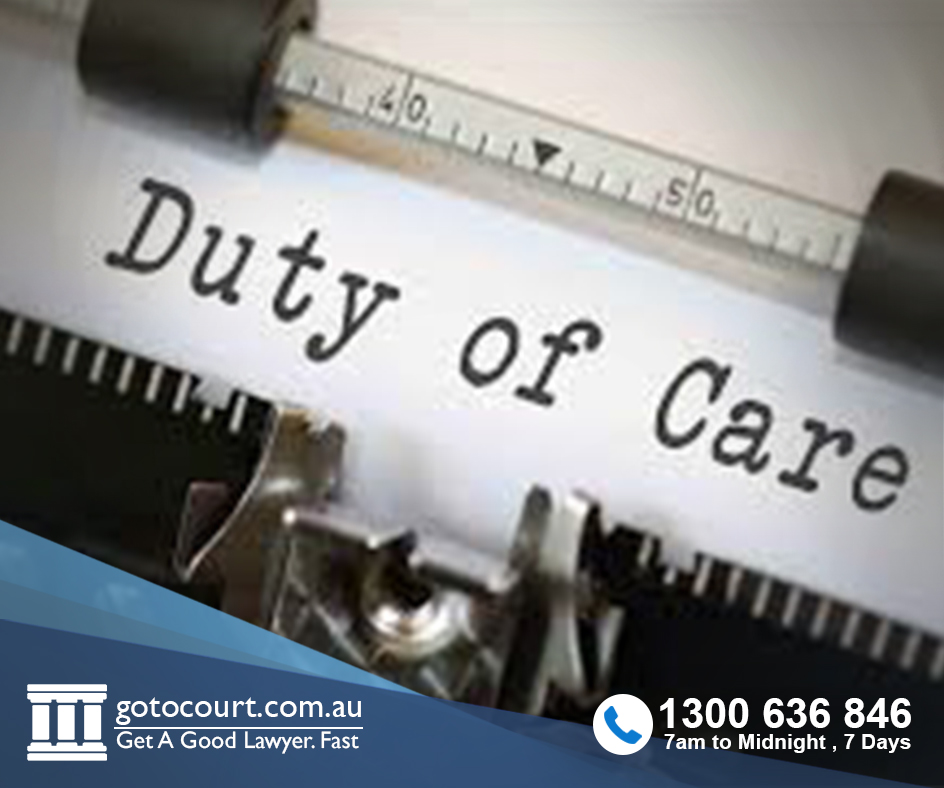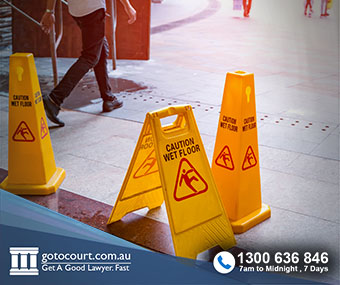Call our lawyers
now
or,
have our lawyers
call you
Teacher Negligence (NSW)
Updated on Dec 12, 2022 • 5 min read • 399 views • Copy Link
Teacher Negligence (NSW)
A teacher has a duty of care towards their students. This duty requires a teacher to take reasonable measures to protect students from incurring foreseeable harm. When a student is injured because of a failure of this duty of care, this may constitute negligence. This page looks at the nature of teacher negligence in New South Wales.
Teacher duty of care NSW
The common law imposes a duty on teachers to take care to avoid harm occurring to their students. A teacher’s duty of care is partially predicated on the fact that students are compelled to attend school during the compulsory schooling period, and while there, they must submit to the authority of their teachers. It is important to note that a teacher’s legal responsibility is not limited to when they are teaching in the classroom or supervising students in the playground. Any time that a teacher identifies a risk to a student at their school, they have an obligation to act. This applies to all school activities and functions where students are in the care of school employees.
Standard of care
The standard of care expected of teachers is that they take reasonable action to prevent students from experiencing foreseeable harm. To satisfy this duty, a teacher should assess and manage any risks associated with an activity. This consideration must encompass the risk to a student of both physical and psychological injury.
Of course, the duty of care does not require a teacher to reduce all possible risks to zero. The duty merely requires that the teacher take reasonable care to prevent harm that is foreseeable. A foreseeable risk is one that is not fanciful or far-fetched. To prevent foreseeable risk, a teacher should:
- Adequately supervise students and take steps to prevent them from injuring themselves or others or damaging property;
- Routinely check that school premises, grounds, and equipment are safe to use;
- Implement and follow effective anti-bullying procedures; and
- Provide medical assistance, or seek medical assistance from a trained person, if a child is injured or unwell.
Typically, the standard of care is commensurate with a student’s ability and maturity. As such, a teacher has a higher duty of care for younger students and those with disabilities.
Violence in schools
Sadly, violence on school property is not unusual in NSW. While the duty of a teacher does not require that they place themselves in physical jeopardy, a teacher must take positive action when there is a risk of a student experiencing physical violence. For instance, there is a long-standing precedent that teachers have an obligation to try to de-escalate fights among students.
To satisfy this duty during an altercation without risking harm to themselves, teachers can:
- Disperse students not directly involved;
- Ask the students involved in the fight to stop and/or leave the premises;
- Call other staff members to the scene to help defuse the situation;
- Call the police; and
- Physically restrain the students involved in the incident if it is safe to do so.
Of course, the teacher’s course of action will be determined by the particular circumstances, including the number of students involved in the altercation, their age and size, the location of the fight itself, whether weapons are involved, and the availability of other assistance.
If a teacher decides that physical intervention in a fight is appropriate, they can apply such force as is proportionate to the threat to themselves or their students. Proportionality is critical here. Certainly, the force required to deal with two eleven-year-olds without weapons is significantly less than may be reasonably applied when there are multiple sixteen-year-olds armed with broken bottles. Teachers who use physical force that is disproportionate to the situation may be subject to criminal assault proceedings and private prosecution.

School duty of care in NSW
School principals have a duty to implement policies and procedures in schools that identify and minimise risk to students.
To fulfil this duty of care, principals should:
- Enforce codes of conduct designed to minimise the risk of critical incidents;
- Implement student discipline policies;
- Implement supervision rosters to account for the needs of the student population;
- Invoke the provisions of the Inclosed Lands Act 1901 to prevent people from entering school grounds;
- Cordon off certain areas of the school as out-of-bounds to students;
- Search school property and student bags when there are reasonable grounds to suspect a risk to students;
- Request police to attend the school to conduct a search of students when there are reasonable grounds to suspect a risk to students; and
- Seek Apprehended Personal Violence orders from the court against anyone who poses an ongoing risk to students or teachers.
Department of education
Under the Work Health and Safety Act 2011, the NSW Department of Education has a duty of care to ensure the safety, health and welfare of all staff and students in public schools. The obligation imposed by legislation equates to the standard applied by a common law duty of care. This duty requires reasonable care to be taken to keep schools safe and free from risk. The Department must also provide appropriate supervision and training of staff to ensure the safety of students.
As an employer, the Department can be held vicariously liable for the negligence of its teachers. In fact, there is a common law principle, reinforced by the Civil Liability Act 2002, that unless a teacher acts with serious and wilful misconduct, they are not personally liable if a student sustains a personal injury due to their negligence. This means that the Department will usually be the defendant in a negligence action arising from injury to a student at an NSW state school.
Please get in touch with the civil law team at Go To Court Lawyers for any further advice on a teacher’s duty of care and negligence claims in New South Wales. Call 1300 636 846 for any legal representation.


Affordable Lawyers
Our Go To Court Lawyers will assist you in all areas of law. We specialise in providing legal advice urgently – at the time when you need it most. If you need a lawyer right now, today, we can help you – no matter where you are in Australia.How It Works








1. You speak directly to a lawyer
When you call the Go To Court Legal Hotline, you will be connected directly to a lawyer, every time.


2. Get your legal situation assessed
We determine the best way forward in your legal matter, free of charge. If you want to go ahead and book a face-to-face appointment, we will connect you with a specialist in your local area.


3. We arrange everything as needed
If you want to go ahead and book a fact-to-face appointment, we will connect you with a specialist in your local area no matter where you are and even at very short notice.



















